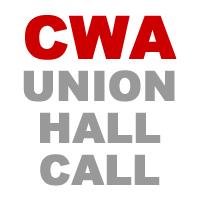Search News
For the Media
For media inquiries, call CWA Communications at 202-434-1168 or email comms@cwa-union.org. To read about CWA Members, Leadership or Industries, visit our About page.
CWA District 9 Testimony: Proposed T-Mobile/Sprint Merger Would Result in “Substantial Public Interest Harm” to California Workers and Consumers
Washington, DC — The Communications Workers of America (CWA) District 9 today submitted official testimony to the California Public Utilities Commission detailing why the CPUC should not approve the proposed T-Mobile/Sprint merger as currently structured, as it would result in "substantial public interest harm" and hurt California workers and consumers.
The new filing, available in full online here and summarized below, comes as California regulators prepare to intensify their exploration of how the proposed T-Mobile/Sprint merger would affect the state. Next week, the California Public Utilities Commission will hold a series of public hearings on the impact of the proposed merger on California, with CWA District 9 representatives and allies set to participate in the hearings scheduled for Tuesday, January 15 in Fresno; Wednesday, January 16 in Los Angeles; and Thursday, January 17 in San Diego.
According to Thomas Runnion, CWA District 9 Vice President, "As state regulators and elected officials explore what the proposed T-Mobile/Sprint merger would mean for California, there's a growing body of evidence that the merger would harm California workers and consumers and should be opposed as currently structured. From eliminating more than 3,300 jobs in California to raising monthly wireless service prices for low-and-moderate consumers across the state, the proposed merger clearly fails the public interest standard, as the testimony filed today explains in detail."
Below are key points from the new CWA District 9 testimony, filed today and available in full online here:
First, the merger would result in the loss of 30,000 jobs across the United States, including 3,342 jobs in California, lower wages, and combine two companies with a long history of labor and employment law violations. CWA's economic analysis, included in the testimony filed today, finds that the merger would result in the closure of more than 900 overlapping retail stores, resulting in the loss of 3,342 jobs in California. See below table for more information on retail store closures and job losses by specific metro area within the state:
The merger also would reduce wireless workers' wages. A recent paper by the Economic Policy Institute and Roosevelt Institute examined the labor market impact of the proposed Sprint/T-Mobile merger on retail workers who sell wireless equipment and services. In California, the authors found that the post-merger average annual earnings of retail wireless workers would decline. For example:
- Los Angeles: $2,906 decline in retail wireless workers annual earnings
- San Francisco: $2,953 decline in retail wireless workers annual earnings
- San Diego: $2,363 decline in retail wireless workers annual earnings
- San Jose: $2,728 decline in retail wireless workers annual earnings
- Sacramento: $2,319 decline in retail wireless workers annual earnings
Second, the proposed horizontal merger of T-Mobile and Sprint raises serious competitive concerns. Economists estimate that the merger would increase prices as much as 15.5 percent on the new T-Mobile's prepaid plans and as much as 9.1 percent for postpaid plans. The merger will disproportionately hurt price sensitive low- and moderate-income customers. T-Mobile's MetroPCS, Sprint's Boost and Virgin Mobile prepaid brands, and their wholesale partners serve 60 percent of the prepaid market, and almost one-third of these customers have annual incomes below $25,000. Post-merger, the new T-Mobile's low- and moderate-income prepaid customers, many of whom depend on their smartphones for broadband access, could be priced out of the wireless market.
Third, the Applicants have not come close, by any stretch of the imagination, to provide rigorous and well documented evidence proving verifiable public interest benefits that will result from the merger. For example, the Applicants fail to prove their assertion that neither Sprint nor T-Mobile can effectively compete as standalone firms, and specifically that the merger is necessary in order to deploy a next-generation nationwide 5G network. And the Applicants' claims of vastly improved service in rural areas are speculative and contradicted by their own assessment. Based on the information in the Applicants' FCC Public Interest Statement, the merged "New T-Mobile" would only provide at most marginally better broadband options than standalone T-Mobile in much of rural America.
